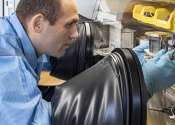Battery materials: What is the battery of the future made of?
The Empa research group led by Maksym Kovalenko is researching innovative materials for the batteries of tomorrow. Whether it's fast-charging electric cars or low-cost stationary storage, there's a promising material or a ...
Nov 7, 2023
0
216









